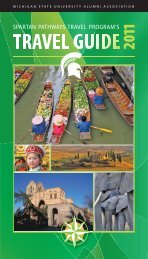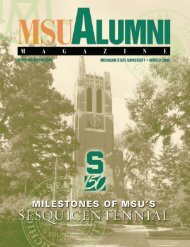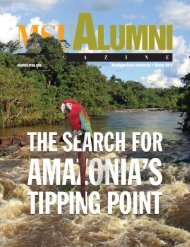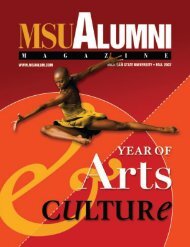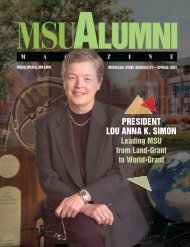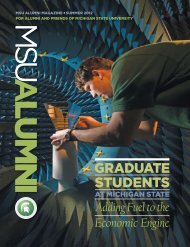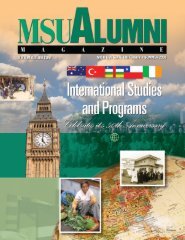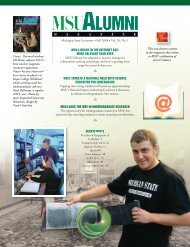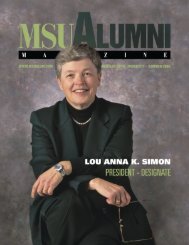mark dantonio - MSU Alumni Association - Michigan State University
mark dantonio - MSU Alumni Association - Michigan State University
mark dantonio - MSU Alumni Association - Michigan State University
Create successful ePaper yourself
Turn your PDF publications into a flip-book with our unique Google optimized e-Paper software.
ROBERT GOLDBORT:<br />
WRITING FOR SCIENCE<br />
Writing for science has surged<br />
in importance in this era of multiple<br />
breakthroughs. Few people<br />
are more qualified to talk about<br />
it than Robert Goldbort, M.A.<br />
’81, Ph. D. ’89, an English professor<br />
at Indiana <strong>State</strong> <strong>University</strong><br />
who boasts two degrees in biology<br />
and two degrees in English,<br />
and whose doctoral thesis at<br />
<strong>MSU</strong> was titled Scientific Writing<br />
and the College Curriculum.<br />
And, in fact, Goldbort has just<br />
published Writing For Science<br />
(Yale <strong>University</strong> Press, 2006),<br />
which is receiving worldwide<br />
Click Right Through for <strong>MSU</strong><br />
www.msualum.com<br />
distribution. “The key to<br />
scientific writing is that you<br />
need absolute objectivity<br />
along with utmost clarity<br />
and simplicity,” he explains<br />
from his office in Terre Haute,<br />
IN. “You cannot afford to be<br />
somewhat unclear in conveying<br />
scientific fact. Ambiguity can<br />
enrich literature, but not scientific<br />
writing.” Robert says that<br />
today’s scientist needs to do a<br />
better job writing. “Many find<br />
writing a bother,” he notes. “Scientists<br />
prefer to be in a lab. But<br />
they need to communicate what<br />
goes on in the lab because much<br />
of today’s research is funded by<br />
the taxpayer.” A native of New<br />
York, Robert became enamored<br />
of scientific writing at <strong>MSU</strong><br />
when he had to teach a freshman<br />
sequence as a graduate assistant.<br />
“I found that, first, that the field<br />
existed, and two, that it was an<br />
exploding field,” he says. “I fell<br />
in love with the whole area.”<br />
He touts his <strong>MSU</strong> advisor Stephen<br />
Tchudi (formerly Judy)<br />
for having encouraged him. “I<br />
can’t give you enough superlatives<br />
about him,” he says. “He<br />
continues to be a model for me<br />
today.” Robert is now working<br />
on a book about “Third Culture<br />
Rhetoric,” dealing with works of<br />
fiction by scientists. “There will<br />
be a chapter about (the late <strong>MSU</strong><br />
molecular biologist) Leonard<br />
Isaacs, who taught in Lyman-<br />
Briggs,” says Robert. “He was<br />
involved in the Clarion Science<br />
Fiction Workshop and was very<br />
much into the use of fiction to<br />
teach basic biology.”<br />
JEMELE HILL:<br />
ESPN PAGE TWO<br />
How do you become a sports<br />
columnist? Be a good sportswriter,<br />
and also—apparently—be<br />
male and white. A recent<br />
survey of 305 newspapers found<br />
only one black female sports<br />
columnist. That was Jemele<br />
Hill, ’97, a sportswriter with the<br />
Detroit Free Press who was hired<br />
in 2005 as a sports columnist by<br />
the Orlando Sentinel. “That was<br />
an absolutely startling stat,” says<br />
Hill, 31. “And now, there are<br />
none.” In December, Jemele left<br />
the Sentinel to become a columnist<br />
for ESPN Page 2 and a writer<br />
for ESPN The Magazine. “This<br />
is a great job and I’m meshing<br />
well and having a lot of fun,”<br />
says Jemele. “ESPN brings<br />
two things no one can match.<br />
One, the audience. Two, the<br />
web site. It’s international.<br />
You write something, and<br />
you might get 1,000 emails.”<br />
Jemele’s initial columns have<br />
been pretty edgy, but creative<br />
and compelling, and<br />
at times humorous. She is<br />
not afraid to tackle racial<br />
angles. “I like to push the envelope,”<br />
she notes. “Sometimes<br />
you need that to make people<br />
think. I’m able to bring a take<br />
that’s different or maybe that<br />
people will talk about behind<br />
closed doors and are afraid to<br />
bring out into the mainstream.”<br />
A native of Detroit, Jemele knew<br />
at a very early age she wanted to<br />
become a sportwriter. At age 15,<br />
she had an internship with the<br />
Detroit Free Press. “Everybody<br />
that worked for them were from<br />
<strong>MSU</strong>,” she recalls. “I found out<br />
that the <strong>MSU</strong> journalism program<br />
had a very strong professional<br />
network, and that’s why I<br />
went to <strong>MSU</strong>.” She joined the<br />
<strong>State</strong> News, becoming managing<br />
editor, but did not cover<br />
sports—opting instead to get a<br />
strong news foundation. “(Journalism<br />
professor) Steve Lacy<br />
was a terrific mentor,” she says.<br />
“He taught me a lot about the<br />
business.” She considers herself<br />
fortunate for her meteoric rise<br />
to columnist. “I certainly didn’t<br />
expect it to happen so early,” says<br />
Jemele. “I feel blessed that my<br />
career has unfolded this way.”<br />
Page 11<br />
046957070001_10-13.indd 11<br />
2/2/07 1:16:16 PM




